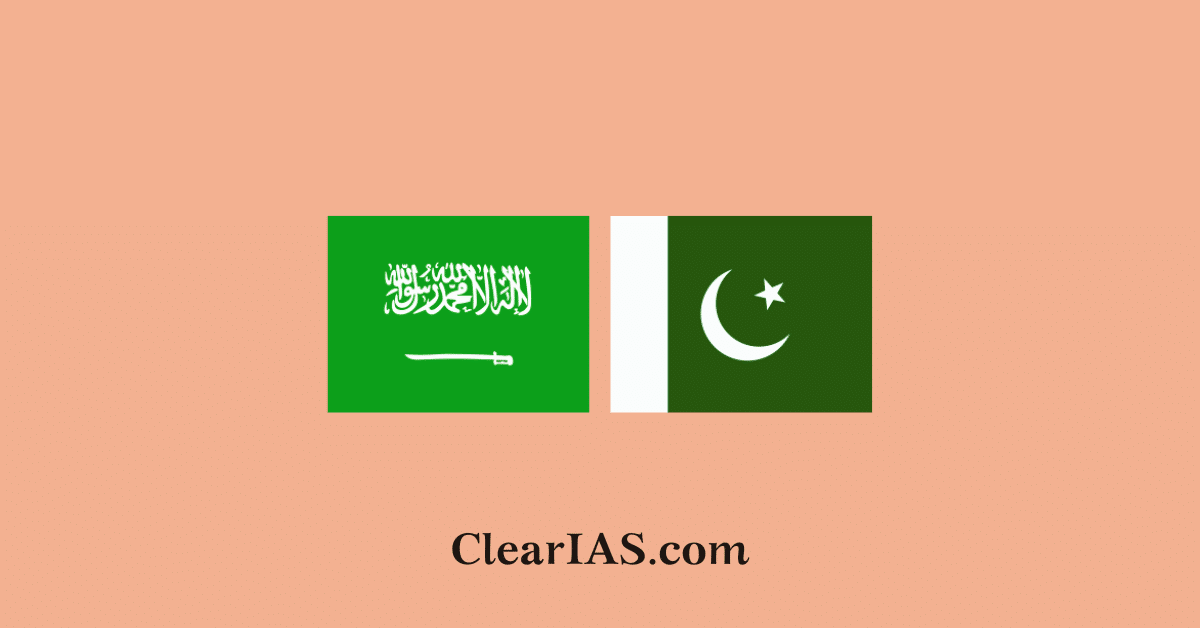
Saudi Arabia-Pakistan Defence Pact indicates a Strategic Shift in Regional Security in the region. Read here to learn more about the geopolitical implications of the pact.
In a development that could significantly alter South Asia and West Asia’s security architecture, Saudi Arabia and Pakistan have signed a landmark mutual defence pact declaring that “any aggression against either country shall be considered aggression against both.”
This agreement, formalising a partnership rooted in shared strategic interests since the 1960s, comes at a time when the region is grappling with shifting alliances, Israel’s expanding military strikes, and waning U.S. security guarantees.
Saudi Arabia-Pakistan Defence Pact
- Mutual Defence Clause: The pact treats an attack on one nation as an attack on both, signalling joint deterrence.
- Strategic Context: Signed after Israel’s recent strike in Qatar and amid perceived U.S. retrenchment from the region, the pact aims to bolster Saudi and Pakistani security in a volatile geopolitical climate.
- Deepened Defence Cooperation: It paves the way for more robust joint training, intelligence sharing, arms purchases, and possibly joint military exercises.
- Symbolic Milestone: This is the first major defence agreement between an Arab nation and a nuclear-armed state, enhancing Pakistan’s strategic weight in the Muslim world.
History of Saudi Arabia-Pakistan Security Ties
- 1960s-1980s: Pakistani troops were stationed in Saudi Arabia, and Islamabad provided military support during the 1979 Mecca Grand Mosque crisis.
- 1982 Bilateral Security Cooperation Agreement: Institutionalised defence cooperation, including training, advisory roles, and arms sales.
- Training and Air Force Collaboration: Pakistani personnel have historically trained Saudi Air Force pilots and ground forces.
- Recent Developments: The pact also comes amid Pakistan’s severe fiscal crisis, with Saudi investments helping stabilise its economy, reinforcing Riyadh’s leverage over Islamabad.
Saudi Arabia’s Strategic Balancing
Saudi Arabia remains a key partner for India even as it deepens its ties with Pakistan:
- Economic Partnership:
- Fifth-largest trading partner of India, with USD 42.98 billion in bilateral trade (FY 2023-24).
- Indian exports stood at USD 11.56 billion, while imports were USD 31.42 billion, primarily crude oil and petrochemicals.
- Political Milestones:
- King Abdullah’s 2006 visit led to the Delhi Declaration, followed by the Riyadh Declaration (2010), elevating ties to a Strategic Partnership.
- PM Modi’s 2016 visit saw him receive Saudi Arabia’s highest civilian honour, the King Abdulaziz Sash.
- Balanced Diplomacy:
- Condemned terror attacks like Pulwama but refrained from criticising India’s Article 370 abrogation or the Balakot airstrikes.
- Has attempted to position itself as a mediator during India–Pakistan tensions, maintaining a pragmatic approach.
Strategic Implications for the Region
- Strengthened Deterrence Against Iran: Riyadh gains additional security backing from a nuclear-armed partner, countering Iran’s influence in Yemen, Iraq, and Syria.
- Enhanced Role for Pakistan: Reinforces Pakistan’s position as a major security provider in the Islamic world, potentially giving it leverage in regional diplomacy.
- Impact on India’s Strategic Calculus: India may need to recalibrate its West Asia outreach to maintain balance between Riyadh and Tehran, while keeping its own ties with Saudi Arabia strong.
- S. and Global Response: The pact may accelerate a post-U.S. Gulf security architecture, with regional players increasingly seeking local alliances for protection.
India’s Cautious Response
India reacted carefully to the announcement, with the Ministry of External Affairs (MEA) stating that it is aware of the long-standing defence ties between the two nations and will “study its implications” for India’s security interests and regional stability.
New Delhi reaffirmed its commitment to protect national interests but refrained from criticising Riyadh, signalling India’s intent to maintain strong bilateral relations with Saudi Arabia, a key energy supplier and strategic partner.
Implications of the Saudi Arabia-Pakistan Defence Pact for India’s Defence and Foreign Policy
Defence Policy Adjustments
- Enhanced Maritime Presence in the Gulf: India may expand its naval deployments in the Arabian Sea and the Persian Gulf under the Mission-Based Deployment framework to safeguard energy shipping lanes and the Indian diaspora.
- Deepening Defence Ties with Gulf Partners: Strengthen defence cooperation with the UAE, Oman, and Saudi Arabia through joint exercises, intelligence sharing, and defence production collaboration to balance Pakistan’s presence.
- Strengthening Indo-US and Indo-France Maritime Security Cooperation: Coordinate with QUAD partners and France (with bases in the UAE and Djibouti) to ensure a stable maritime security architecture in the Indian Ocean Region.
Diplomatic & Strategic Engagement
- Reinforcing Ties with Saudi Arabia: India will likely step up high-level visits, economic cooperation, and strategic dialogues to ensure that Riyadh continues its balanced approach toward India and Pakistan.
- Maintaining Dialogue with Iran: Given Saudi–Pakistan alignment, India may re-engage with Iran (Chabahar Port, INSTC project) to secure alternate strategic footholds and energy options.
- Leveraging Multilateral Forums: Use platforms like G20, SCO, and I2U2 to keep West Asian partners engaged in inclusive regional security frameworks that do not marginalise India.
Counter-Terrorism & Security Concerns
- Monitoring Arms Transfers: India will closely watch whether Saudi-funded weapons to Pakistan shift the conventional or nuclear balance, particularly in light of Pakistan’s economic constraints.
- Strengthening Counter-Terrorism Cooperation: Seek greater intelligence-sharing with Gulf partners to ensure that no financial or logistical support flows to anti-India terror groups through the Gulf corridor.
Energy Security & Diaspora Protection
- Energy Supply Security: Given that Saudi Arabia is India’s 2nd largest oil supplier, India must ensure long-term contracts and diversification to cushion against geopolitical shocks.
- Protection of Indian Diaspora: With over 2.5 million Indians in Saudi Arabia, contingency plans (like Operation Rahat in Yemen) must be strengthened for any regional conflict scenario.
Conclusion
The Saudi Arabia-Pakistan Defence Pact marks a turning point in regional geopolitics, signalling a stronger military alignment between the two nations and reshaping the balance of power in West Asia and South Asia.
For India, the development calls for careful diplomacy: strengthening its strategic and economic partnership with Riyadh, maintaining open channels with Pakistan where possible, and deepening security cooperation with other Gulf partners to safeguard its energy, trade, and diaspora interests in the region.
Related articles:







Leave a Reply